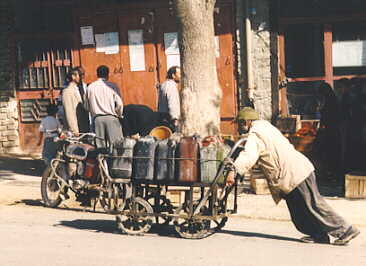
| Info | ||||||
| ||||||
| News | ||||||
|
||||||
| Contact Us | ||||||
|
Thousands of Workers Protest in Behshahr, Iran
April 18, 2003- Workers in the City of Behshahr, Mazandaran Province, Iran staged an angry protest on Wednesday, April 16, 2003. The protest was initiated by the textile workers at the “Behshahr’ Chintz-making” factory against the withholding of their wages over the past 26 months and soon was joined by nearly 30,000 workers from textile and other sectors as well as the city’s residents at large (the official estimate was 10,000 but even the head of the state-affiliated Workers’ House in Mazandaran province acknowledged that the number of protesters were nearly 30,000). This was not the first protest by textile workers since the company’s management and the state’s authorities did not fulfill their promises, as the result of that angry and frustrated workers were left with no choice but to stage a number of street protests and rallies. The protesters faced harsh attacks by security forces, in which tear gas and other weapons were used against them. Workers vowed if they don’t receive prompt response from the authorities, they would soon launch further protests and strikes. Behshahr workers are not alone in their struggle for payment of delayed wages. According to the 2002 survey by the International Confederation of Free Trade Unions at least one million workers in Iran have not been receiving their wages ranging from two to 36 months. Sit-ins, Strike actions, demonstrations and blockage of roads are some of the methods used by protesting workers in their struggles against delayed payment of wages and for improved working conditions and better social and income security programs. Workers are fed up with lack of any accountability from officials and the violent treatment they continuously receive by the security forces and thus are expanding and intensifying their protests in any ways they possibly can.
Workers in Iran are facing many challenges in their struggles for the realization of their rights and demands. One of the main barriers is the Islamic Republic of Iran’s repressive and anti-worker labour law, policies and practices, which encompass lack of the right to organize free and independent workers’ organizations and the right to strike, persecution of labour activists and political opponents, lay offs, cut backs, and privatizations and deregulations in pursuit of the “economic structural adjustment” policies of the international Monetary Fund, World Bank and global and national corporations.
|